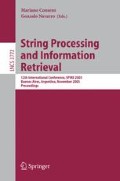Abstract
In this article we will introduce a new approach (and several implementations) to the task of sentence classification, where pre-defined classes are assigned to sentences. This approach concentrates on structural information that is present in the sentences. This information is extracted using machine learning techniques and the patterns found are used to classify the sentences. The approach fits in between the existing machine learning and hand-crafting of regular expressions approaches, and it combines the best of both. The sequential information present in the sentences is used directly, classifiers can be generated automatically and the output and intermediate representations can be investigated and manually optimised if needed.
This work is supported by the Australian Research Council, ARC Discovery grant no. DP0450750.
Access this chapter
Tax calculation will be finalised at checkout
Purchases are for personal use only
Preview
Unable to display preview. Download preview PDF.
References
Brill, E.: A simple rule-based part-of-speech tagger. In: Proceedings of ANLP1992, third Conference on Applied Natural Language Processing, Trento, Italy, pp. 152–155 (1992)
Clément, J., Flajolet, P., Vallée, B.: The analysis of hybrid trie structures. In: Proceedings of the Ninth Annual ACM-SIAM Symposium on Discrete Algorithms, pp. 531–539. SIAM Press, Philadelphia (1998)
Geertzen, J., van Zaanen, M.: Grammatical inference using suffix trees. In: Paliouras, G., Sakakibara, Y. (eds.) ICGI 2004. LNCS (LNAI), vol. 3264, pp. 163–174. Springer, Heidelberg (2004)
Hachey, B., Grover, C.: Sentence classification experiments for legal text summarisation. In: Proceedings of the 17th Annual Conference on Legal Knowledge and Information Systems, Jurix 2004 (2004)
Lang, K.J., Pearlmutter, B.A., Price, R.A.: Results of the Abbadingo One DFA learning competition and a new evidence-driven state merging algorithm. In: Honavar, V.G., Slutzki, G. (eds.) ICGI 1998. LNCS (LNAI), vol. 1433, pp. 1–12. Springer, Heidelberg (1998)
Li, X., Roth, D.: Learning question classifiers. In: Proceedings of the 19th International Conference on Computational Linguistics (COLING), Taipei, Taiwan, August 24–September 1. Association for Computational Linguistics (ACL), pp. 556–562 (2002)
Pizzato, L.: Using a trie-based structure for question analysis. In: Asudeh, A., Paris, C., Wan, S. (eds.) Proceedings of the Australasian Language Technology Workshop, Macquarie University, Sydney, Australia, December 2004, pp. 25–31. ASSTA (2004)
Teufel, S., Moens, M.: Argumentative classification of extracted sentences as a first step towards flexible abstracting. In: Mani, I., Maybury, M. (eds.) Advances in automatic text summarization. MIT Press, Cambridge (1999)
Proceedings of the Twelfth Text Retrieval Conference (TREC 2003), Gaithersburg, MD, USA, November 18–21. Number 500-255. NIST Special Publication. Department of Commerce. National Institute of Standards and Technology (2003)
van Zaanen, M.: Bootstrapping Structure into Language: Alignment-Based Learning. PhD thesis, University of Leeds, Leeds, UK (January 2002)
van Zaanen, M.: Theoretical and practical experiences with Alignment-Based Learning. In: Proceedings of the Australasian Language Technology Workshop, Melbourne, Australia, December 2003, pp. 25–32 (2003)
van Zaanen, M., Adriaans, P.: Alignment-Based Learning versus EMILE: A comparison. In: Proceedings of the Belgian-Dutch Conference on Artificial Intelligence (BNAIC, Amsterdam, The Netherlands, October 2001, pp. 315–322 (2001)
Voorhees, E.M., Buckland, L.P. (eds.): Proceedings of the Eleventh Text REtrieval Conference (TREC 2002), Gaithersburg, MD, USA, November 19–22, Number 500-251. NIST Special Publication, Department of Commerce, National Institute of Standards and Technology (2002)
Zhang, D., Lee, W.S.: Question classification using support vector machines. In: Clarke, C., Cormack, G., Callan, J., Hawking, D., Smeaton, A. (eds.) Proceedings of the 26th annual international ACM SIGIR conference on Research and development in information retrieval, pp. 26–32. ACM Press, New York (2003)
Author information
Authors and Affiliations
Editor information
Editors and Affiliations
Rights and permissions
Copyright information
© 2005 Springer-Verlag Berlin Heidelberg
About this paper
Cite this paper
van Zaanen, M., Pizzato, L.A., Mollá, D. (2005). Classifying Sentences Using Induced Structure. In: Consens, M., Navarro, G. (eds) String Processing and Information Retrieval. SPIRE 2005. Lecture Notes in Computer Science, vol 3772. Springer, Berlin, Heidelberg. https://doi.org/10.1007/11575832_15
Download citation
DOI: https://doi.org/10.1007/11575832_15
Publisher Name: Springer, Berlin, Heidelberg
Print ISBN: 978-3-540-29740-6
Online ISBN: 978-3-540-32241-2
eBook Packages: Computer ScienceComputer Science (R0)

